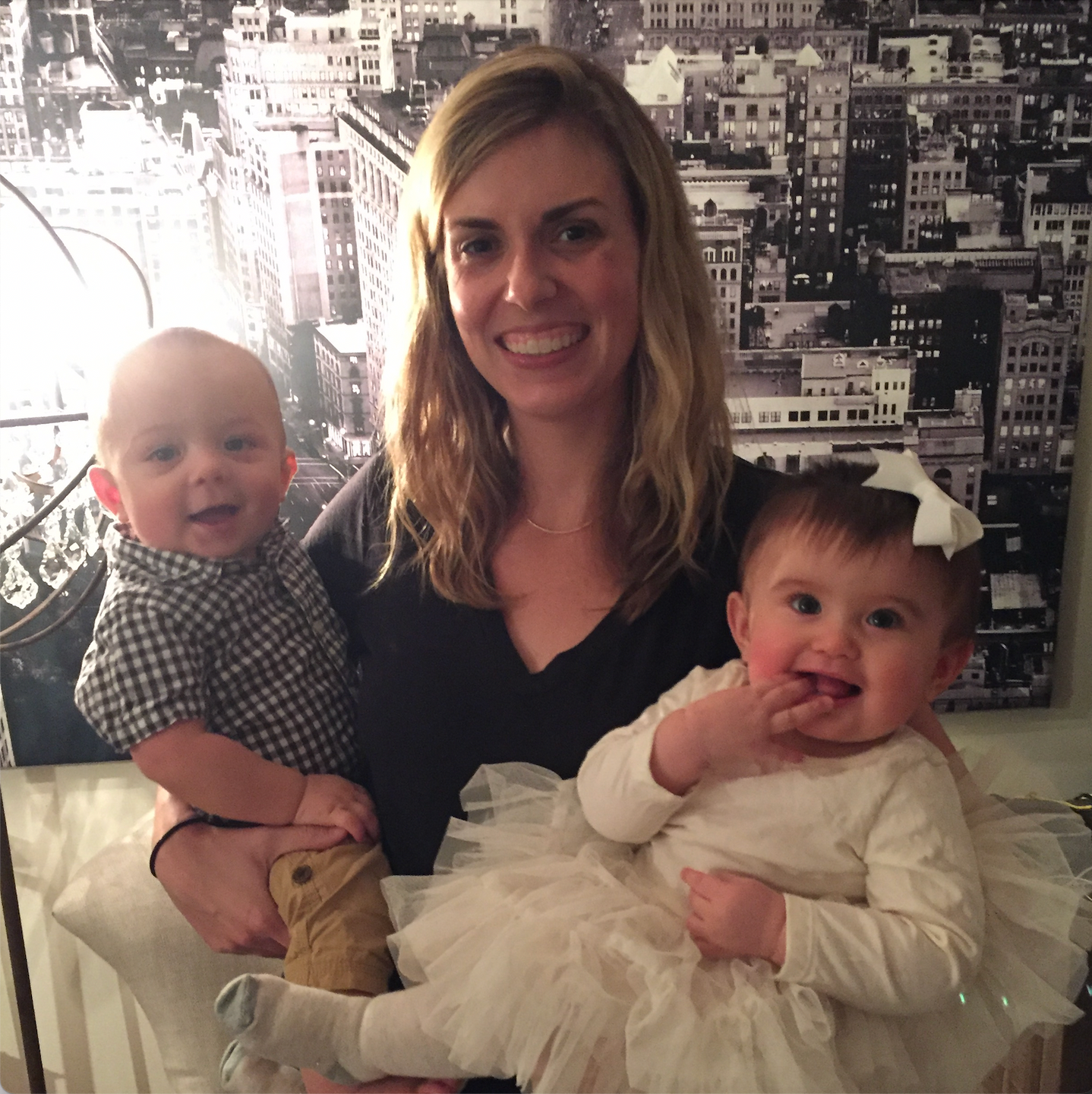Alex's story:
Yes, it’s possible to be an entrepreneur while raising twins
What does an MIT and Harvard Business School grad and entrepreneur need to make life a little more challenging? Twins might do the trick. But that didn’t stop this mom and business leader from prioritizing what she wanted out of her career and achieving it with flying colors.
Alex began her career at The Boston Consulting Group (BCG) and pursued her MBA at Harvard Business School shortly after. Alex then co-founded Quincy, a direct-to-consumer womens wear line for professional clothing. After two years, a seed round of funding, and a lot of lessons learned, the Quincy team closed their doors in 2013.
Alex then moved to Google as a product manager, where she led innovative rollouts as part of the Payments team. Little did she know she’d soon be rolling out something even more significant in her life -- she was pregnant with twins.
While on her five month maternity leave at Google, Alex began to consider what’s next. She knew she wanted to pursue a more prominent role with more responsibility, greater visibility, and more intensity.
Alex decided that the startup life wasn’t for her this time around. She wanted more for her family than the high risk and hustle culture associated with joining a young startup.
But she did want to do something entrepreneurial. After hearing a BCG panel discussion about entrepreneurial work within larger corporations, Alex had a bell go off. Being part of a big company (and the associated benefits, career pathing, and security associated with it) while using her entrepreneurial spirit to scale teams? Count her in.
The bell must’ve reverberated in the recruiting space because she received an email from a recruiter a few weeks later while still on parental leave at Google. The recruiter described the role as an “entrepreneurial opportunity within the tech space, where you’d be building businesses around the globe as part of a large multinational corporation.” This was exactly what she was looking for. She began interviewing with ZX Ventures, which is the venture arm of Anheuser-Busch InBev. The process took about a month during the tail end of maternity leave (with twins!). She got the job.
Alex first started in ZX Ventures’ innovation group and then became the president of one of their subsidiaries in Minnesota. Now, she’s the managing director of another one of their subsidiaries in the UK.
In hindsight, she realizes that she made a lot of smart decisions coming out of her maternity leave that set her up for continued success at home and at work.
Keep reading to learn how Alex identified her desired career path, claimed her worth and boundaries, and succeeded in growing both a global team and a young family. Dive deeper below.


How Alex set up an optimized system for parental leave
- Her husband took 7 weeks of FMLA: Because her husband did not receive paid parental leave, they decided he would take FMLA right after the twins were born. By the time he went back to work, he was fully bonded with the kids and knew how to do every aspect of caretaking so it never all fell all on Alex.
- Hired a nanny (instead of using daycare) which was a more supportive and flexible childcare model for them: They didn’t want to have to rush home by a certain time every day to pick up the kids from daycare, or waste time commuting to daycare in the morning. They set up a nanny arrangement that allowed them to flex their hours, and they had the nanny arrive during breakfast to help get the kids up and ready to go.
- Their nanny started working part-time the day that Alex’s husband returned to work - and helped Alex for three months while she was still on leave: Instead of waiting until Alex was also back at work, they brought in help early. When both parents were on leave, they could split day/night responsibilities, as the twins were premature and still waking up frequently at night. With Alex’s husband back at work, they knew they needed more support. To start, the nanny worked three days per week, then four days per week. This also helped Alex feel much more comfortable with leaving the twins with the nanny when she went back to work.
- Followed the advice of the book “12 hours of sleep by 12 weeks old” to establish consistent sleep and feeding schedules: “This book literally changed our lives.” The book provides detailed feeding and sleeping schedules and walks you through how to achieve them based on your baby’s weight - so it was easy to adjust for Alex’s twins who were born premature. It also provided an explicit plan that every caretaker could follow to ensure consistency. By the time Alex was back at work, both kids were sleeping eleven hours straight because of this book.
- Switched to exclusively formula at 7 weeks: Switching to formula was one of the best decisions Alex says she made. “One of my biggest regrets is breastfeeding - I wish I had never breastfed. Formula feeding was the definition of efficiency. We bought pre-mixed bottles of similac formula off of Amazon and stored them on the counter. We'd pop on a disposable nipple, shake, and feed them lukewarm milk. It meant that anyone could feed them, I could get a night off on the weekends, and it made getting them on a feeding routine much easier.”
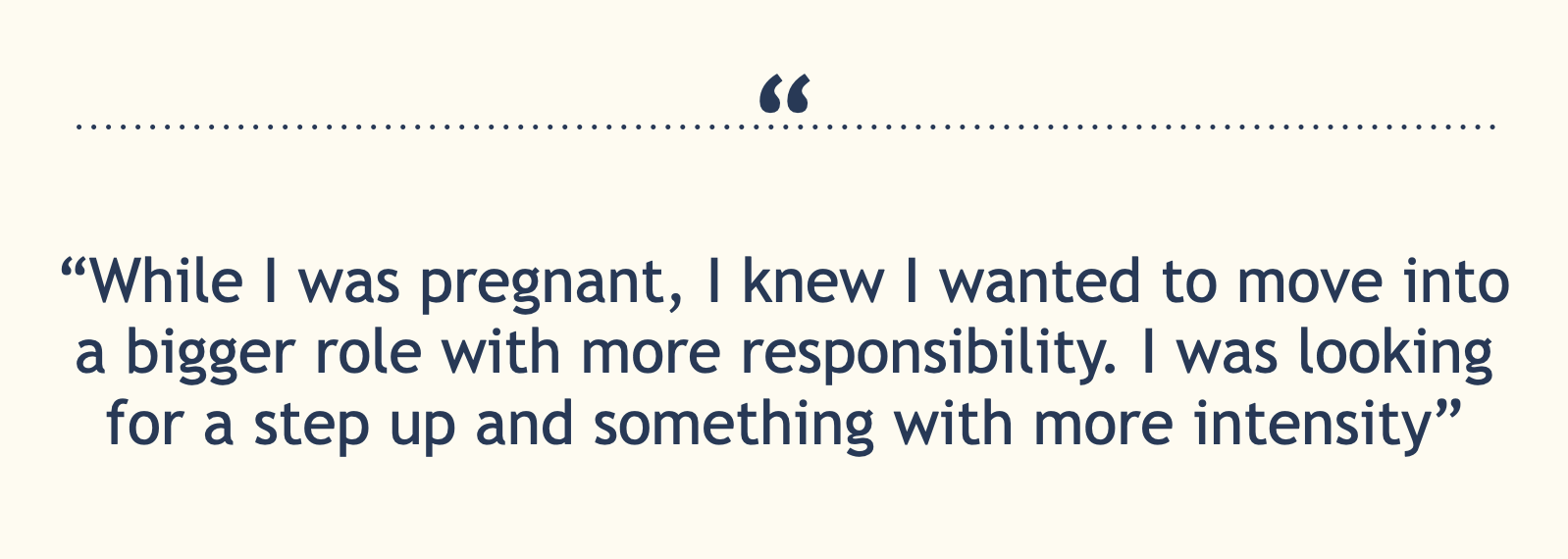
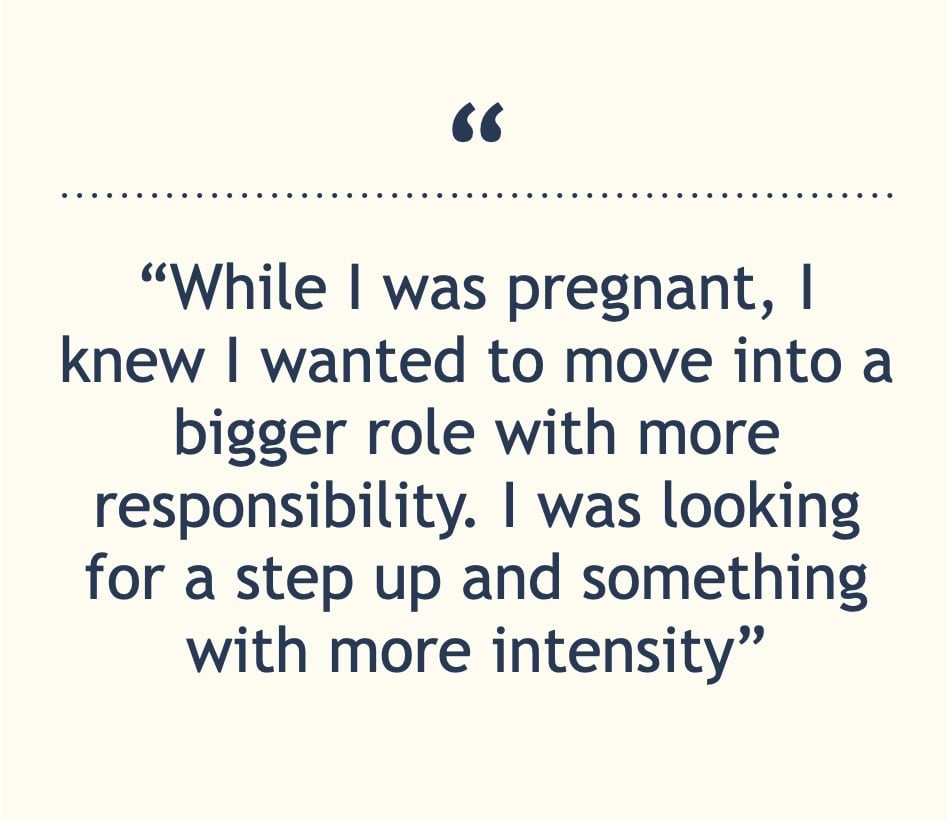
The key factors Alex says contributed to her success as a new mother in a big role
Starting a new job is tough in the best of circumstances - let alone as a new mother of twins. But Alex points to several key factors that she says set her up for maximum success.
- Leadership role: Stepping into a leadership role was key. “The group was undefined when I joined. Getting a leadership role was really critical because it allowed me to set my priorities and therefore define how I would spend my time.”
- Childcare: The most important factor for Alex’s ability to focus on a new, intense role was having quality childcare. She knew if her kids were safe and thriving, she would do well at her job.
- Boundaries, work schedule and saying no: “I am a boundaries person. Even at my first job out of college I set a strict schedule for my working hours. So having children didn’t really require me to set new boundaries.”
- Having a good manager: There is nothing better than having a manager who supports and understands you. While potentially hard to figure out via an interview process, Alex feels lucky to have been so supported by her manager and leadership team.
- Focusing on her work: “Whether this mattered or not, I felt that I needed to be seen just as anyone else at work and like myself before kids. I would have been really uncomfortable leaving early to pick my kids up from daycare and having to tell people that I needed to do that. I have no idea if it would have mattered - but it would have impacted the way I felt about myself.”
- Short commute: Alex had a 20 minute commute, and her husband had a 15 minute commute. This meant they had more productive time in their day to either spend on work or personal time.
- International travel: Alex tended to do all of her travel one week a month, so it was grouped together. She would either extend the nanny's hours to help her husband or plan grandparent visits for the week so that her husband would get a break in the evenings.
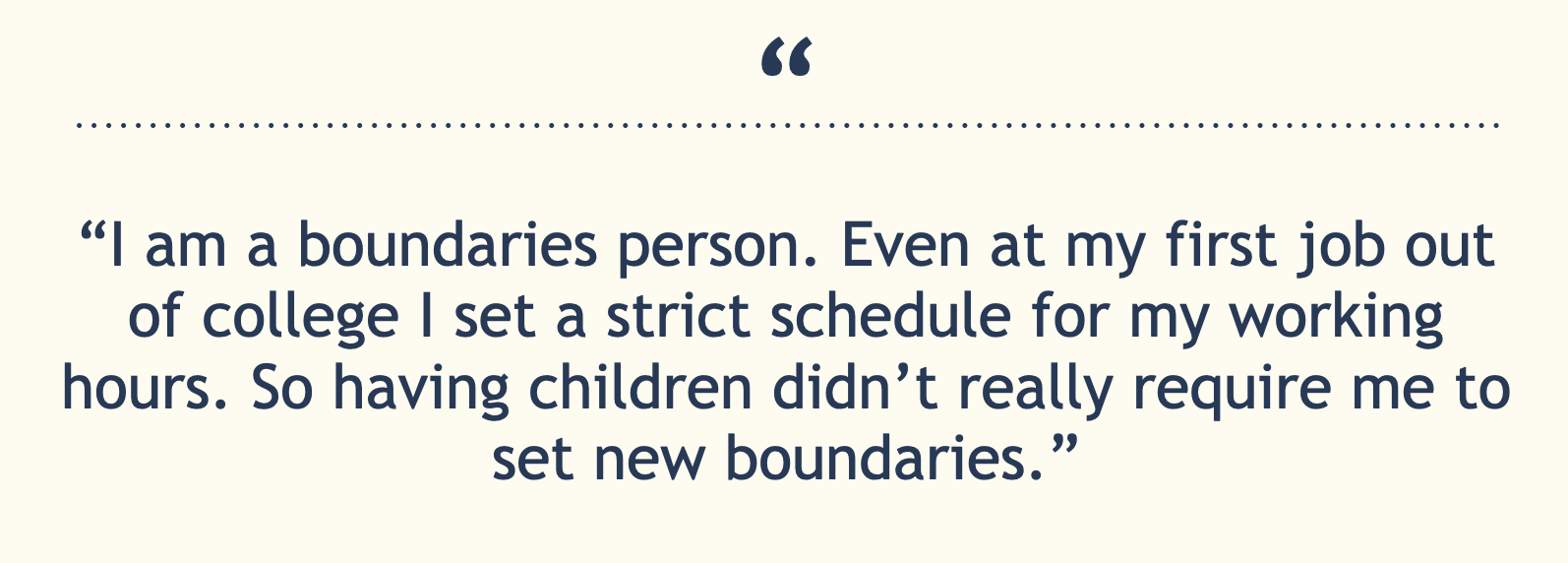
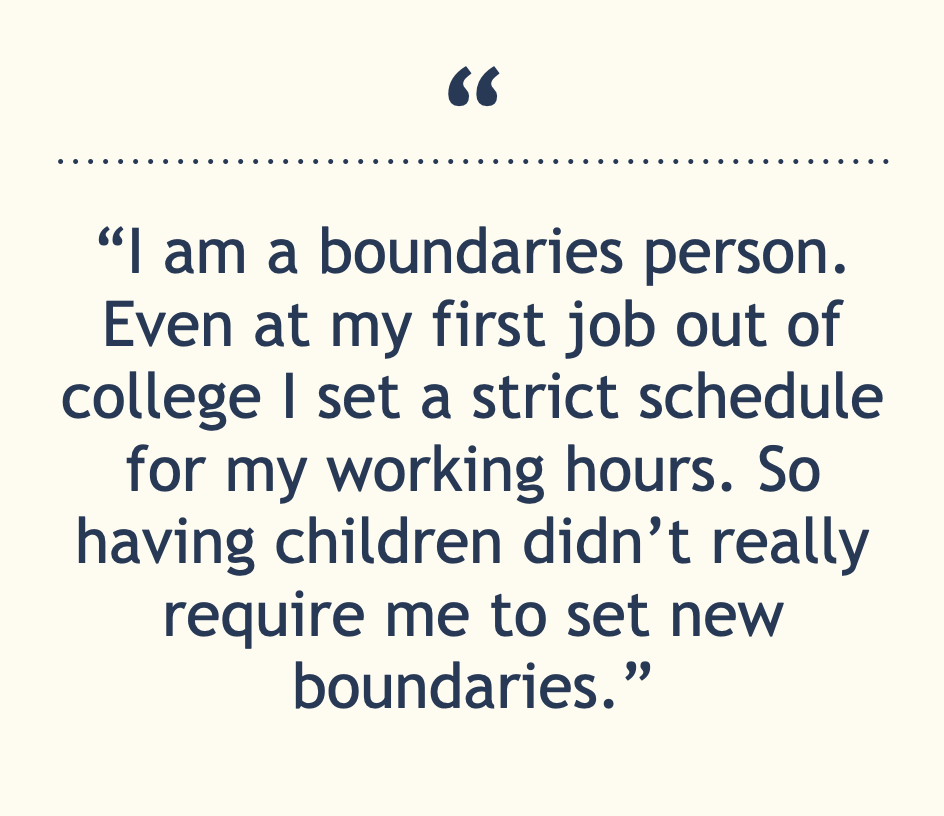
Want to read more of these stories?
We'll send them straight to your inbox every time we publish a new profile (two times per month).
Send them to me!
